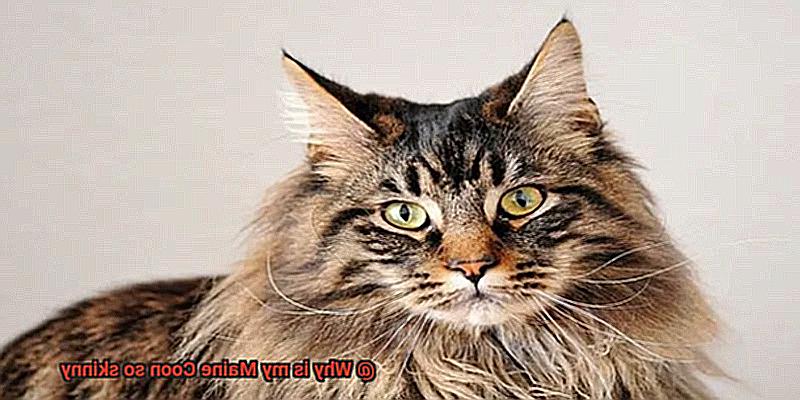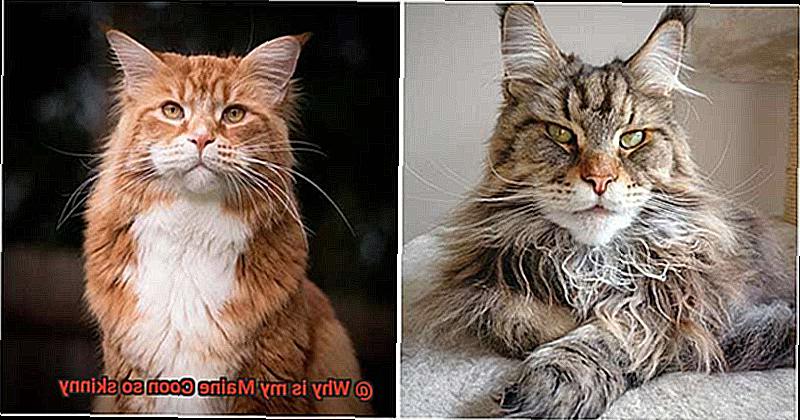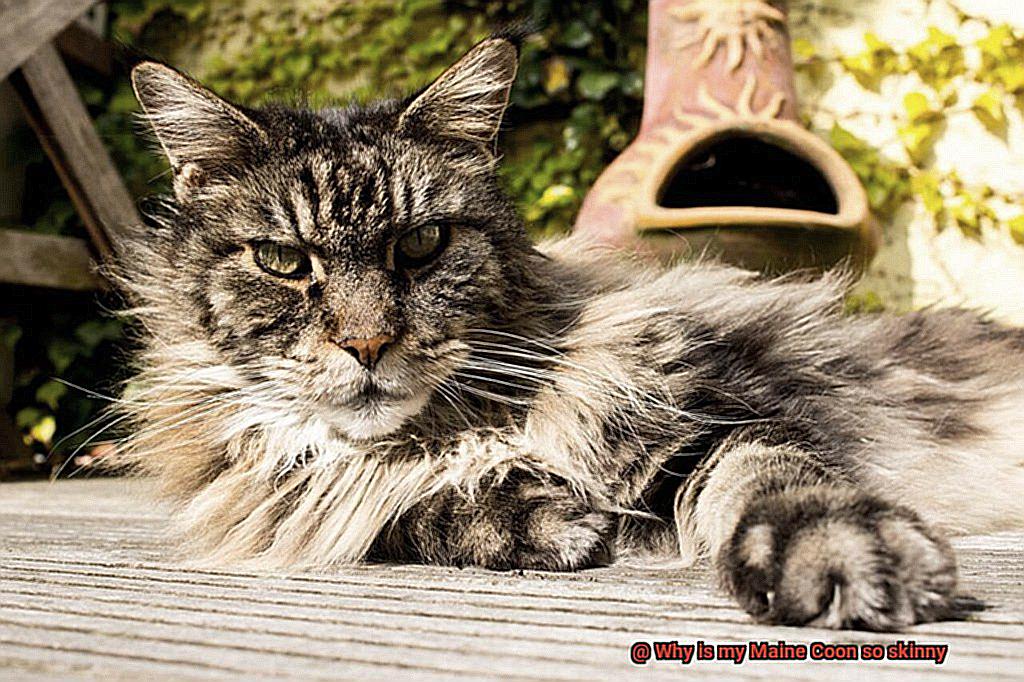Is your beloved Maine Coon looking a bit too skinny for comfort? As a cat parent, it’s natural to worry about your feline friend’s health and well-being. You’re not alone in this predicament – many cat owners have experienced the same fear and helplessness when their cat suddenly loses weight.
While a skinny cat may not be alarming for some breeds, it can be concerning when it comes to Maine Coons. These majestic cats are known for their large size and seeing them looking underweight can be distressing.

There are several reasons why your Maine Coon may be skinny, and not all of them are related to their diet. It could be due to medical issues, behavioral problems, or environmental factors that need addressing. Identifying the root cause is crucial to ensure your cat’s health and nutrition needs are met.
In this blog post, we’ll take you through the possible reasons why your Maine Coon may be looking thin and what you can do to help them regain weight. So sit tight, relax, and prepare yourself to become an expert on all things Maine Coon as we delve into the reasons behind your feline friend’s weight loss.
Causes of Weight Loss in Maine Coons
While they are known for their large size and muscular build, there are several reasons why Maine Coons might experience weight loss.
One common cause of weight loss in Maine Coons is dental problems. Tooth decay or gum disease can make it difficult or painful for a cat to eat, leading to a decrease in appetite and subsequent weight loss. If you notice your Maine Coon avoiding their food or having difficulty eating, it may be time to schedule a visit with your veterinarian. After all, a healthy mouth equals a healthy cat.
Another potential reason for weight loss is an underlying medical condition such as hyperthyroidism. This condition can cause a cat’s metabolism to speed up and result in weight loss despite increased appetite. Don’t hesitate to have your cat evaluated by a vet if you suspect this may be the cause. Early detection and treatment can save your cat’s life.
Stress can also impact a Maine Coon’s weight. Changes in routine or environment, such as moving to a new home or the introduction of a new pet, can lead to stress and anxiety that may cause a decrease in appetite and weight loss. Remember to give your cat plenty of love and attention during these times of change.

Moreover, not consuming enough calories can lead to weight loss in Maine Coons. Ensure that your cat is being fed a diet that is high enough in calories for their needs and that they are being fed enough throughout the day. If your Maine Coon is very active or has recently increased their activity levels, they may require more food to maintain their weight. Make sure to consult with your veterinarian about the appropriate amount of food for your furry friend.
Health Issues as a Cause of Weight Loss
Although dental issues or anxiety can be common culprits, some underlying health issues can cause more severe weight loss. In this informative post, we’ll examine the various health problems that can lead to weight loss in Maine Coon cats.
One of the most frequent causes of weight loss in Maine Coons is thyroid problems. Cats, like humans, can suffer from hyperthyroidism, where the thyroid gland overproduces thyroid hormone, causing an increased metabolism and weight loss. While this condition is more prevalent in older cats and can be diagnosed through blood tests and ultrasound, it can affect Maine Coons of any age.
Diabetes is another potential health issue that can lead to weight loss in Maine Coons. When the body cannot regulate blood sugar levels, high blood sugar levels and weight loss can result. A veterinarian can diagnose this condition through blood tests and urine analysis. Treatment typically entails insulin injections and dietary changes.
Intestinal parasites such as worms are yet another cause of weight loss in Maine Coons. These parasites feed on the nutrients in your cat’s food, leading to malnutrition and weight loss. Luckily, regular deworming treatments can prevent these pesky parasites from causing issues.
Finally, cancer is a grave concern as a potential cause of weight loss in Maine Coons. Tumors can significantly impair a cat’s ability to eat or absorb nutrients from their food, resulting in dramatic weight loss. Although cancer is more common in older cats, it can occur at any age. Diagnostic tests such as biopsies or X-rays are necessary for identifying cancer as the root cause of weight loss.
Diet as a Cause of Weight Loss
It’s crucial to understand that just like humans, cats need a well-balanced diet for maintaining a healthy weight.
If your Maine Coon is not getting enough food or nutritionally balanced meals, they may start to lose weight. To ensure that your cat stays healthy, make sure they are receiving adequate protein, fats, and carbohydrates in their diet. With Maine Coons requiring a high protein intake, it’s essential to ensure that their food contains at least 30% protein.
Another reason why your furry friend may be losing weight is that they are not eating enough. Sometimes cats can be picky eaters, and if they’re not interested in eating or don’t like their food, they may not consume enough calories to maintain their weight. To avoid this, make sure that you’re feeding your cat enough and that they are eating regularly.
It’s also critical to keep an eye on your cat’s weight over time. If you notice that your Maine Coon is gradually losing weight, it’s essential to take them to the veterinarian for a check-up. Several medical conditions can cause cats to lose weight, including hyperthyroidism and diabetes. So taking your cat for a regular check-up can help identify any underlying conditions early on.
Stress as a Cause of Weight Loss
One common issue that can arise is weight loss, and stress is often the root cause. Like humans, cats can become stressed due to changes in their environment, routine, or diet, leading to a lack of appetite and subsequent weight loss.
So how can you identify if your Maine Coon is experiencing stress? Keep a lookout for excessive grooming, hiding, or avoidance behavior. If you suspect stress is the culprit, it’s essential to address the source of the problem. Providing a calm and stable environment, plenty of playtime and exercise, and access to favorite toys and bedding can help reduce stress levels.
But what if your cat still isn’t gaining weight? In some cases, a change in diet may be necessary to support healthy weight gain. However, it’s crucial to consult with a veterinarian before making any significant changes to your cat’s diet. They can provide valuable guidance on what nutrients and supplements may be needed to support healthy weight gain.
aRyAXSj3Qcc” >
Tips for Keeping Your Maine Coon at a Healthy Weight
However, just like with any other cat breed, some Maine Coons may struggle with maintaining a healthy weight. As an expert on these majestic creatures, I’ve compiled five essential tips to help you keep your Maine Coon at a healthy weight.
Watch their diet
Feeding your Maine Coon a high-quality, balanced diet that is specifically formulated for their breed and life stage is crucial for maintaining a healthy weight. Avoid feeding them table scraps or too many treats as this can lead to overeating and weight gain.
Get them moving

Maine Coons are active cats that love to play. Encourage exercise by providing toys that stimulate their natural instincts, like climbing structures or interactive toys. You can also take them for walks on a leash or let them roam outside in a safe, enclosed area.
Keep them hydrated
Proper hydration is essential for overall health and maintaining a healthy weight. Ensure that your Maine Coon has access to fresh, clean water at all times.
Monitor their weight
Regularly monitor your Maine Coon’s weight to ensure they are maintaining a healthy weight range. If you notice any significant changes, consult with your veterinarian to rule out underlying health issues.
Reduce stress levels
Stressful situations such as moving to a new home or introducing new pets can cause anxiety in cats and affect their appetite and weight. Provide your Maine Coon with a comfortable environment and plenty of playtime and attention to reduce stress levels.
Also Read: Why Is Your Maine Coon So Skinny?
Conclusion
In conclusion, if you’ve noticed that your Maine Coon is looking a bit too skinny lately, it’s important to get to the root of the problem. While dental issues, anxiety, and diet can be common culprits for weight loss in cats, there could also be underlying health conditions or environmental stressors at play.
As a responsible pet owner, there are several steps you can take to help your Maine Coon regain weight and maintain a healthy range. Keep an eye on their diet, provide plenty of exercise and playtime, make sure they’re getting enough water, monitor their weight regularly, and try to reduce any sources of stress.
It’s crucial to remember that Maine Coons have unique nutritional needs. Feeding them a high-quality diet specially formulated for their breed and life stage is key to maintaining a healthy weight. And if you notice any significant changes in your cat’s behavior or weight, don’t hesitate to schedule an appointment with your veterinarian.







